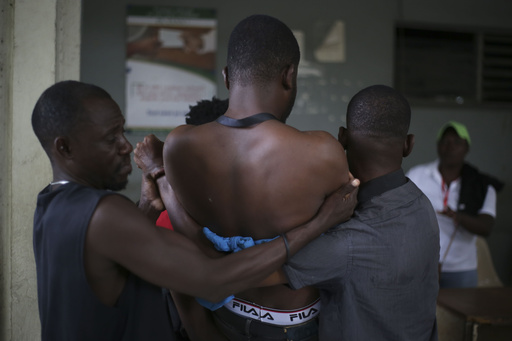Tragedy Strikes as Gang Violence Claims Lives of Journalists in Haiti
PORT-AU-PRINCE, Haiti — A gang-related attack resulted in the deaths of two journalists and left several others injured during the reopening of Port-au-Prince’s largest public hospital on Tuesday, according to Haiti’s online media association. The assault also claimed the life of a police officer.
Earlier this year, street gangs forced the General Hospital to shut down, and the authorities announced plans to reopen the facility on Christmas Eve. However, as journalists gathered to report on the reopening, gunfire erupted from suspected gang members, leading to chaos and violence.
This incident adds to the ongoing wave of violence that has gripped Haiti, which is facing an unprecedented crisis characterized by coordinated assaults on various institutions, including prisons, police stations, and even the main international airport.
Robest Dimanche, a spokesperson for the Online Media Collective, confirmed the identities of the slain journalists as Markenzy Nathoux and Jimmy Jean. He stated that several reporters were injured during the attack, which he attributed to a coalition of gangs known as Viv Ansanm.
The Haitian Association of Journalists corroborated the deaths of the two reporters and the police officer, while reporting that seven journalists sustained injuries in what it described as “a macabre scene comparable to terrorism.”
Responding to the tragedy, Haiti’s interim president, Leslie Voltaire, addressed the nation, expressing condolences to the victims, their families, and emphasizing the significance of the work done by journalists and police. He refrained from detailing the number of casualties.
“I extend my sympathies to all who fell victim to this tragedy, including our national police and the journalists,” Voltaire stated.
Following the shootout, the government released a statement declaring it would “respond firmly to the attack.” The statement described the attack as “heinous,” condemning it as an attack on the very pillars of society that rely on health and life.
Earlier reports included a disturbing video uploaded by journalists trapped inside the hospital, showing two lifeless bodies on stretchers, clothed in bloodied garments, with one wearing a press credential around his neck. Radio Télé Métronome reported initially that seven journalists and two police officers had been injured, though police and officials were slow to respond to requests for further information.
Another unverified video surfaced, showing reporters taking cover inside the hospital, with at least three apparently injured and lying on the floor.
Currently, street gangs are estimated to control about 85% of Port-au-Prince, including targeting major institutions like the main international airport and Haiti’s two largest prisons.
Johnson “Izo” André, recognized as the leading figure among Haiti’s gangs and a member of the Viv Ansanm coalition, claimed responsibility for the attack via a social media video, asserting that the hospital’s reopening had not been sanctioned by the gang.
The targeting of journalists in Haiti is not a new phenomenon. In 2023 alone, two journalists were killed within a few weeks: Dumesky Kersaint was shot dead in mid-April, followed by the discovery of journalist Ricot Jean’s body later that month.
In July, former Prime Minister Garry Conille visited the General Hospital after officials managed to reclaim it from gang control. During that visit, he witnessed the dire conditions as the hospital lay in ruins, littered with debris and marked by bullet holes from violent clashes between police and gangs. Positioned across from the national palace, the hospital has been the backdrop of numerous confrontations.
The incessant gang violence in Haiti has severely impacted the healthcare system, with widespread looting and the destruction of medical facilities and pharmacies pushing it toward collapse. The surge in violence has led to increased numbers of patients with dwindling resources to treat them.
As Haiti enters the rainy season, the healthcare system faces even more challenges, including heightened risks of water-borne diseases. Poor living conditions in makeshift camps have escalated the threat of diseases like cholera, with UNICEF reporting over 84,000 suspected cases across the country.
